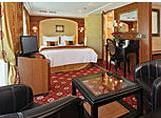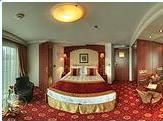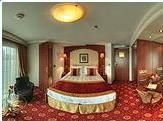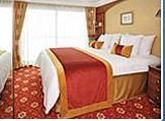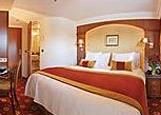Treasures, Amsterdam to Budapest Southbound ex Amsterdam to Budapest
14 Night Cruise Only
Request Price
per person
Cruise Itinerary
| Date | Port | Arrive | Depart |
|---|---|---|---|
| 18 May 2025 | Amsterdam, Rivers | Embark | Overnight |
| 19 May 2025 | Amsterdam, Rivers | ||
| 20 May 2025 | Cologne, Germany | ||
| 21 May 2025 | Rudesheim, Germany | ||
| 22 May 2025 | River Cruising | Main River | |
| 23 May 2025 | Wurzburg, Germany | or Rothenburg | |
| 24 May 2025 | Bamberg, Germany | ||
| 25 May 2025 | Main-Danube Canal | ||
| 25 May 2025 | Nuremberg, Germany | ||
| 26 May 2025 | Regensburg, Germany | ||
| 27 May 2025 | Passau, Germany | Cruising the Danube | |
| 28 May 2025 | Melk, Austria | ||
| 28 May 2025 | Vienna, Austria | Overnight | |
| 29 May 2025 | Vienna, Austria | ||
| 30 May 2025 | Bratislava, Slovakia | ||
| 31 May 2025 | Budapest, Hungary | Overnight | |
| 1 Jun 2025 | Budapest, Hungary | Disembark |
Cruise along banks of the River Danube as the river's breeze pushes you on an amazing journey past grand cathedrals, medieval monasteries, castles and vineyards.
Pass through five countries including the Netherlands, Germany, Austria, Slovakia, and Hungary, and explore legendary cities such as Amsterdam, Vienna, Köln, Nürnberg, Bratislava and Budapest. Tauck's all-included private shore excursions take you to many UNESCO World Heritage Sites, including the historic districts of Budapest, Vienna, and Bamberg, and the Wachau and Rhine valleys. In Vienna, take your choice of visits to Schönbrunn Palace or the Sisi Museum at the Hofburg, and attend a grand Imperial Evening in a traditional palace. In Amsterdam, tour the famed Rijksmuseum. Visit Köln Cathedral, Melk Abbey, medieval towns like Regensburg, Budapest's Heroes' Square and much more!
Highlights of this cruise:
Amsterdam
Amsterdam, the capital of The Netherlands is built around a concentric network of canals spanned by over 1000 bridges making canal cruises one of the most attractive ways of viewing the city. Many of the houses date back to the 17th century. These narrow-fronted merchants' houses are characterised by the traditionally Dutch ornamented gables.
The oldest part of the city is Nieuwmarkt, located near the first canals - Herengracht, Prinsengracht and Keizersgracht - built to protect the city against invasion in the 17th century. Today, Amsterdam's famous liberalism has survived in the city's 'coffee shops and thriving sex industry.
The city has also long been a centre of diamond cutting and it is still possible to see diamond cutters at work. Amsterdam has a booming cultural life, boasting 53 museums, 61 art galleries, 12 concert halls and 20 theatre. A special canal boat (the 'museum boat') links 16 of the major museums. In the local countryside it is still possible to see working windmills. There are annual events such as the Amsterdam Arts Week and the Holland Festival.
Bamberg
Bamberg is a city in Bavaria, Germany. It is located Upper Franconia on the river Regnitz, close to its confluence with the river Main. Bamberg extends over seven hills, each crowned by a beautiful church. This has led to Bamberg being called the "Franconian Rome". Bamberg is one of the few cities in Germany that was not destroyed by World War II bombings because of a nearby Artillery Factory that prevented planes from getting near to Bamberg.
Bamberg’s Old Town is listed on the UNESCO World Heritage List, primarily because of its authentic medieval appearance. Some of the main sights are the Cathedral (1237), with the tombs of emperor Henry II and Pope Clement II, Alte Hofhaltung, residence of the bishops in the 16th and 17th centuries, Neue Residenz, residence of the bishops after the 17th century, Old Town Hall (1386), built in the middle of the Regnitz River, accessible by two bridges, Klein-Venedig ("Little Venice"), a colony of picturesque fishermen's houses from the 19th century along one side of the river Regnitz, Michaelsberg Abbey, built in the 12th century on one of Bamberg's "Seven Hills" and Altenburg, castle, former residence of the bishops.
Vienna
Vienna is a unique blend of the historic and the modern with a wealth of architecture and artistic and musical heritage. Many of the world’s most important composers, including Beethoven and Mozart, have lived and performed behind Vienna’s Baroque façades. In addition to this Baroque splendor, there are excellent examples of Art Nouveau architecture .
The heart of Vienna is the Innerestadt where some of Vienna’s most popular tourist attractions can be found, along with pedestrianized streets lined with countless shops, cafés, bars and restaurants. The center point is the Graben (literally ‘moat’), which is a wide square lined with shops and pavement cafés under large umbrellas. Following the demolition of the city walls in 1857, the Ringstrasse was laid out and some of Vienna’s most beautiful buildings were built along it, between 1858 and 1865. Among the most important are the Staatsoper (State Opera House), Kunsthistorisches Museum (Museum of Fine Arts), Naturhistorisches Museum (Natural History Museum), Parlament (Parliament), Rathaus (City Hall) and Burgtheater.
Budapest
Budapest is the capital of Hungary. As the largest city of Hungary, it is the country's principal political, cultural, commercial, industrial, and transportation centre. Cited as one of the most beautiful cities in Europe, its extensive World Heritage Sites includes the banks of the Danube, the Buda Castle Quarter, Andrássy Avenue, Heroes' Square and the Millennium Underground Railway, the second oldest in the world. Other highlights include a total of 80 geothermal springs, the world's largest thermal water cave system, second largest synagogue, and third largest Parliament building.
Most of Budapest's famous sights are concentrated on Castle Hill on the Buda side, in downtown Pest and along the riverside walkways. The main sights on Castle Hill are the Royal Palace, the National Gallery, the Fisherman’s Bastion and Matthias Church. In downtown Pest the main sights are the Parliament Building, St Stephen’s Basilica, the Great Synagogue and the Jewish Museum and the Eötvös Loránd University.
Budapest is also known for its many hot and thermal springs. Budapest has 118 hot springs that supply the city’s many bathhouses and spas with warm therapeutic spring water. Such was the reputation of its springs that in 1934, the Budapest was declared the “City of Springs.”

Cruising Europe's inland waterways exclusively for Tauck, the sister ships ms Swiss Emerald, ms Swiss Sapphire, ms Swiss Jewel and new-for-2011 ms Treasures represent the epitome of luxurious river cruising. In addition to their spacious, well-appointed cabins, all four ships offer 14 beautiful 300-square-foot suites – equipped with floor-to-ceiling windows, marble baths, flat-screen televisions and walk-in closets – as well as 7 junior suites, adding up to four times more suites than most other European riverboats. The cabins, which range from 150 to 183 sq. ft., provide plush accommodations with plasma TV, terry bathrobes, fine L'Occitane toiletries, large windows and much more; 85% of the cabins have floor-to-ceiling windows with French balconies. A crew of 29 attentively serves just 118 guests. The Restaurant offers both an elegant dining venue and a fine dining experience, while the spacious Panorama Lounge in the bow, with its bar, dance floor and entertainment, is a delightful gathering spot in the evenings. The gracious Lido Bar in the stern has a 180° glass wall that opens for an indoor / outdoor cocktail hour, and offers alternative bistro dining featuring lighter fare – a first on Europe’s rivers. Tauck's riverboat fleet is definitely “top-of-the-line”!
Ship Profile & Stats
- Maiden voyage: 2011
- Length: 361 ft
- Beam: 37 ft
- Draft: 4 ft
- Ship registration: Switzerland
- Passenger capacity (dbl): 118
- Crew nationality: Mostly European
Ship Amenities
- Plasma TV
- Terry Bathrobes
- L'Occitane toiletries
Ship Facilities
- Restaurant
- Panorama Lounge
- Lido Bar
- Dance Floor
- Bistro Dining
- Internet Corner
- Fitness Centre
- Whirlpool
- Sun Deck
- Laundry Service (limited)
What makes Tauck's Small Ship Cruising and River Cruising unique is our focus on the destination – in scenic ports of call that connect you with people and places... moving, compelling and heart-warming experiences onboard and ashore... inspiration through Tauck's cruise travel. We cast anchor in pristine bays, off island beaches and at docks accustomed to personal yachts... in small towns and villages along the great rivers of Europe... and in some of the world's favorite cities. Our time ashore is enriched by in-depth cultural exploration and insider access that ensures up-close-and-personal connections with the locals and daily life. Our cruise travel adventures include guided sightseeing with local experts such as naturalists, historians, and accomplished lecturers. You'll dine on regional cuisine on land at aboard ship that showcases specialties of the destination. And after a day of extraordinary sightseeing, we welcome you back onboard our hand-picked vessels for warm camaraderie and lively conversation that's inherent on every Tauck cruise travel experience. The stories are endless, the memories are timeless and the connections priceless.



